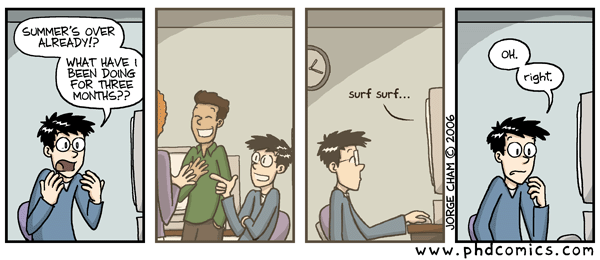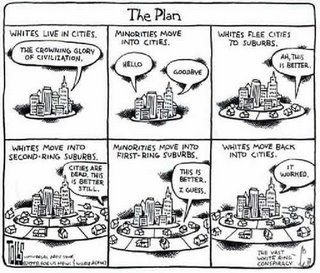Al Gore's documentary "An Inconvenient Truth" is interesting and good in a variety of ways.
His arguments and presentation of facts about global warming isn't new, though compelling. For someone who have studied the science of climate change, he or she would find this film a little light. Rather, it is a good primer for those who are skeptical or know nothing of the situation. His solutions, also, aren't new or provoking. But that's the point. The solutions and technologies are out there. It's a question of whether people will accept the responsibility of our actions and the necessary change in the way we live.
The visuals, are like most good visuals, stunning. Like the works of Ed Burtynsky, you can't help but feel a little shock and disappointed by the massive change humanity is causing, particularly the difference in glacier sizes around the world.
And while most of the film is Al Gore "giving" his presentation (the one he's delivered in thousands of places across the world) to a small audience, it is also partly a documentary into his life and his fascination with the issue throughout his political career, from being in committees in Congress to his stint as VP and through to his presidential bid and its aftermath. Not only does this prevent the film from being a 90 minute slideshow presentation, it provides a glimpse into a man who could be raking in $50,000 fees giving speeches about his political career, but insteads decides to travel around the world talking about ice cores and global ocean currents and carbon dioxide emissions.
It is the loss in 2000 that spurred him to return to his lecture on climate change. And it seems as though the title has two meanings, one for the audience and one for him. In that, while for us, the inconvenient truth is of course, the way we live is impacting the Earth and our own future severely, for him, it's that perhaps he was never meant to be the President of the United States. While one might argue that he would wield more political clout as the President to affect change, it's interesting whether he would have been bogged down by the responsibilities to his country and to the office to be truly effective.
Instead, his responsibility is now to the world at large, and he has given the scientific community something else: A face and a voice. Perhaps this is his niche, his role: to be the Paul Revere of climate change, to warn us of the dangers ahead.
He seems suited because he straddles both the scientific and political community. He understands the language of the scientists. But having served in politics, he is a much better and more recognized orator than any scientist could be. In doing so, he could deliver the message, like the film, with effectiveness, using both scientific studies, but also with a little bit of humour (his presentation includes a clip from Matt Groening's Futurama about global warming) and visuals to cement his argument. Besides, with all due respect, I doubt most people would be able to pick out NASA scientist James Hansen (one of the biggest voices about climate change in the scientific community) from a line-up. It was a little annoying, though, during the film when he'd drop names like Carl Sagan as if he was a bowling buddy. But conversely, his connections with so many climate change scientists just shows how much attention the scientific community is paying to him.
I don't, however, share Gore's optimism. The people who should see this will probably not because it wouldn't interest them. And that's the problem. The people who would see this move have or will change their behaviour. The rest don't see it affecting their lives. But by the time that it does affect their lives and the clamour for change finally happens, it'll be too late. It seems that as much as we don't want to be told what to do, we need government to force this change upon us. Humans rarely change behaviour unless they are forced to. And either we can force the rest of the citizens to change now through our laws, or we can let the resulting consequences from global warming do it for us. That too is an inconvenient truth




















